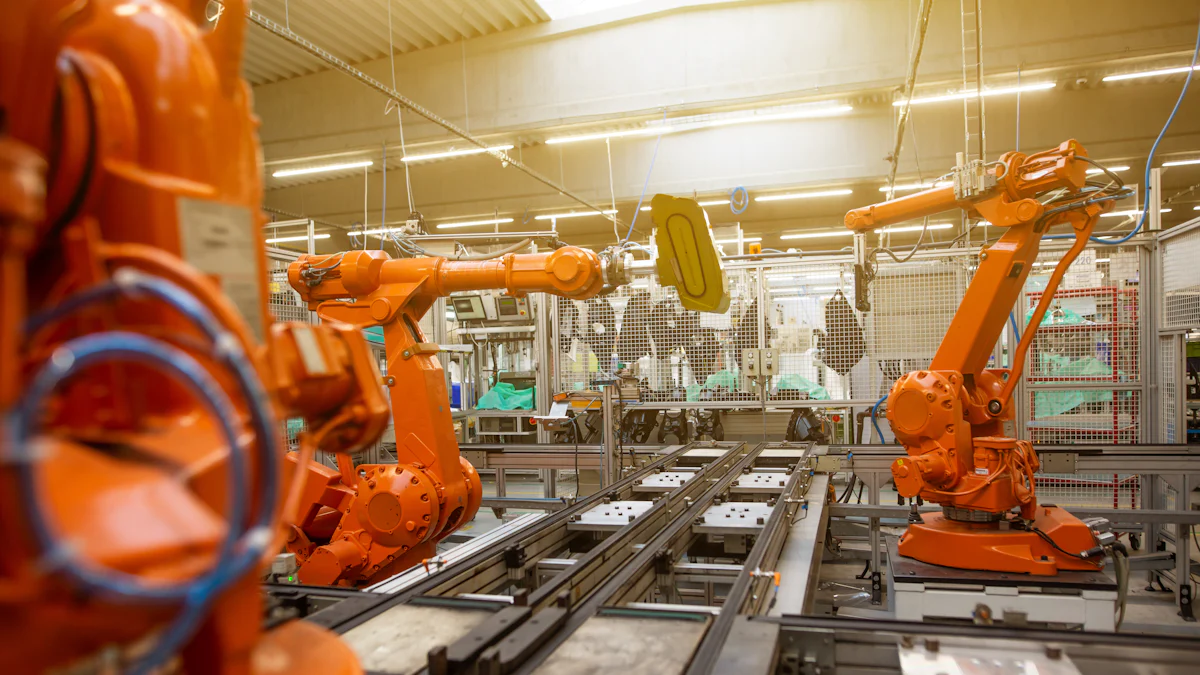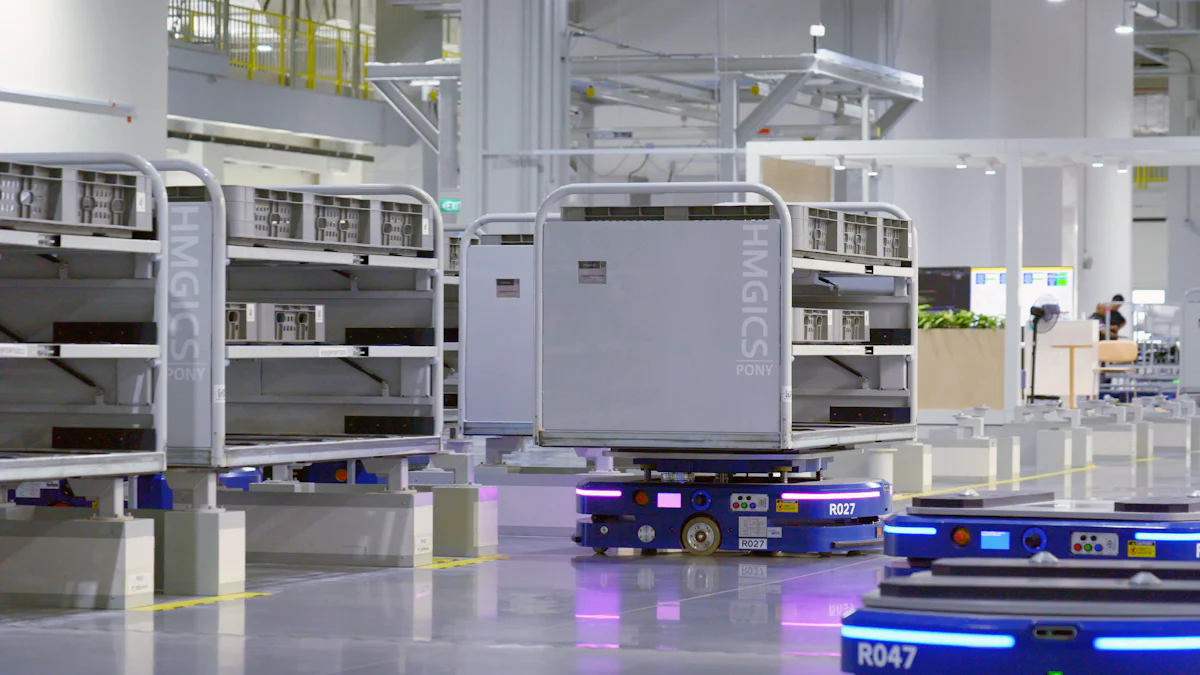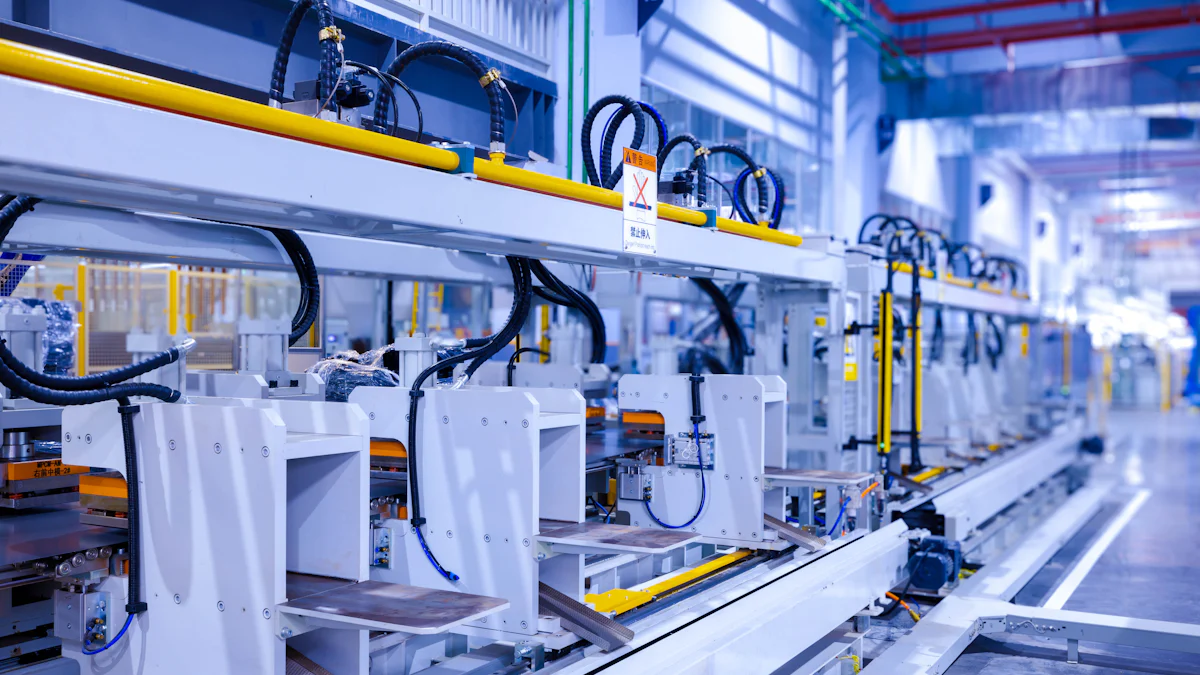Smart Manufacturing's Role in Optimizing Logistics Processes

Smart manufacturing transforms traditional production methods through advanced technologies. Logistics plays a vital role in manufacturing by ensuring efficient movement of materials and products. Smart manufacturing enhances logistics by integrating real-time data and automation, leading to streamlined processes and reduced costs.
Understanding Smart Manufacturing
Key Technologies in Smart Manufacturing
Internet of Things (IoT)
The Internet of Things (IoT) serves as a cornerstone in smart manufacturing. IoT sensors collect real-time data from equipment and production systems. This data is then communicated to the cloud for analysis. Manufacturers use this information to make informed decisions. The integration of IoT enhances operational efficiency by enabling predictive maintenance and optimizing resource utilization.
Artificial Intelligence (AI)
Artificial Intelligence (AI) plays a pivotal role in smart manufacturing. AI algorithms analyze data collected from IoT devices. This analysis drives insights and decision-making processes. AI enables automation, reducing the need for manual labor. The implementation of AI improves production efficiency and product quality. AI also facilitates rapid prototyping and customization.
Robotics and Automation
Robotics and automation are integral to smart manufacturing. These technologies streamline production processes. Robotics reduces human error and increases precision. Automation enhances productivity by performing repetitive tasks efficiently. The deployment of robotics and automation leads to cost reduction and increased output. Manufacturers leverage these technologies to maintain a competitive edge.
Benefits of Smart Manufacturing
Increased Efficiency
Smart manufacturing significantly boosts efficiency. Real-time data analytics optimize production schedules. Predictive maintenance minimizes downtime. Automation accelerates manufacturing processes. These factors contribute to a more efficient supply chain. Enhanced efficiency results in faster delivery times and improved customer satisfaction.
Cost Reduction
Cost reduction is a primary advantage of smart manufacturing. Automation decreases labor costs. Predictive maintenance reduces repair expenses. Optimized resource utilization lowers material costs. These cost-saving measures enhance profitability. Manufacturers can reinvest savings into innovation and growth.
Enhanced Product Quality
Smart manufacturing elevates product quality. IoT sensors monitor production conditions. AI algorithms detect anomalies in real time. Robotics ensures precision in assembly processes. These technologies contribute to consistent product quality. Enhanced quality strengthens brand reputation and customer loyalty.
Challenges in Logistics Processes
Common Logistics Issues
Supply Chain Disruptions
Supply chain disruptions present significant challenges in logistics processes. External factors such as natural disasters, geopolitical tensions, and pandemics can halt operations. Manufacturers face difficulties in sourcing raw materials. Delays in production schedules occur frequently. Disruptions lead to increased lead times and reduced customer satisfaction.
Inventory Management
Inventory management remains a critical issue in logistics. Overstocking results in increased storage costs. Understocking leads to missed sales opportunities. Accurate demand forecasting proves challenging for many businesses. Inefficient inventory management impacts cash flow negatively. Companies require advanced systems to maintain optimal inventory levels.
Transportation Delays
Transportation delays disrupt the smooth flow of goods. Traffic congestion and poor infrastructure contribute to these delays. Weather conditions often affect transportation schedules. Delays result in late deliveries and dissatisfied customers. Businesses need reliable logistics partners to mitigate these challenges.
Impact of Inefficient Logistics
Increased Costs
Inefficient logistics processes lead to increased operational costs. Redundant processes consume valuable resources. Manual handling of tasks increases labor expenses. Poor inventory management results in additional storage costs. Businesses experience reduced profitability due to these inefficiencies.
Customer Dissatisfaction
Customer dissatisfaction arises from inefficient logistics. Delayed deliveries frustrate consumers. Inaccurate order fulfillment damages brand reputation. Poor communication with customers exacerbates the problem. Businesses risk losing loyal customers due to these issues. Efficient logistics processes are essential for maintaining customer satisfaction.
Role of Smart Manufacturing in Optimizing Logistics

Integration of Smart Technologies
Real-time Data Analytics
Smart manufacturing employs real-time data analytics to enhance logistics processes. IoT devices collect vast amounts of data from various points in the supply chain. This data provides insights into inventory levels, transportation routes, and delivery schedules. Manufacturers utilize these insights to make informed decisions that improve efficiency. Real-time data analytics helps identify bottlenecks and optimize resource allocation. This approach reduces lead times and minimizes costs.
Predictive Maintenance
Predictive maintenance is a critical component of smart manufacturing. IoT sensors monitor equipment health and performance continuously. Data collected from these sensors undergoes analysis using AI algorithms. This analysis predicts potential equipment failures before they occur. Manufacturers schedule maintenance activities proactively to prevent unplanned downtime. Predictive maintenance ensures smooth operations and enhances logistics efficiency. This strategy reduces repair costs and extends equipment lifespan.
Case Studies and Examples
JUSDA's Implementation of IoT in Logistics
JUSDA has successfully implemented IoT technologies in logistics operations. IoT devices track shipments in real time, providing visibility across the supply chain. This tracking enables precise monitoring of goods from origin to destination. JUSDA leverages IoT data to optimize transportation routes and schedules. This optimization reduces transit times and enhances delivery accuracy. The implementation of IoT demonstrates JUSDA's commitment to digital transformation.
JUSDA's Use of AI for Predictive Maintenance
JUSDA utilizes AI for predictive maintenance in logistics systems. AI algorithms analyze data from IoT sensors to predict equipment failures. This predictive capability allows JUSDA to perform maintenance before issues arise. The proactive approach minimizes downtime and ensures continuous operations. JUSDA's use of AI enhances operational efficiency and reduces maintenance costs. This innovation showcases JUSDA's excellence in supply chain management.
Future Trends in Smart Manufacturing and Logistics

Emerging Technologies
Blockchain
Blockchain technology is revolutionizing logistics processes. The decentralized nature of blockchain ensures transparency and security in transactions. This technology records every transaction in a supply chain. Each record is immutable and verifiable. Blockchain reduces fraud and errors in logistics operations. Smart manufacturing benefits from blockchain by enhancing traceability. Manufacturers can track products from origin to destination. This capability improves accountability and trust among stakeholders.
5G Connectivity
5G connectivity is transforming smart manufacturing and logistics. The high-speed network enables real-time data transmission. Manufacturers utilize 5G for seamless communication between devices. This connectivity supports the integration of IoT and AI technologies. 5G enhances the efficiency of smart manufacturing processes. Logistics operations benefit from improved tracking and monitoring capabilities. Autonomous vehicles rely on 5G for navigation and coordination. The logistics sector experiences reduced costs due to 5G infrastructure.
Industry Predictions
Increased Adoption of Smart Manufacturing by 2030
Experts predict widespread adoption of smart manufacturing by 2030. Advanced technologies will become integral to production processes. Manufacturers will rely on IoT, AI, and robotics for efficiency. The industry will witness significant improvements in product quality. Smart manufacturing will drive innovation across various sectors. Companies will invest in digital transformation initiatives. The adoption of these technologies will enhance global competitiveness.
Integration of Autonomous Vehicles in Logistics
Autonomous vehicles are set to revolutionize logistics operations. These vehicles operate without human intervention. Smart manufacturing processes will incorporate autonomous transportation. Logistics companies will benefit from reduced labor costs. Autonomous vehicles ensure timely deliveries and minimize delays. The integration of these vehicles enhances supply chain efficiency. Manufacturers will leverage this technology for optimized logistics processes. The future of logistics lies in automation and innovation.
Smart manufacturing reshapes logistics by integrating IoT, AI, and automation. These technologies enhance efficiency and resilience in supply chains. The future of logistics will see increased adoption of smart manufacturing. This shift promises improved agility and cost-effectiveness. Industry leaders must embrace these innovations. Adoption ensures competitiveness and operational excellence. Smart manufacturing stands as a pivotal force in modern logistics.
See Also
Efficiently Managing High-Tech Manufacturing Logistics for Success
Maximizing Warehouse Efficiency with Logistics Robotics
Transforming Logistics for the Future with AI
Optimizing Supply Chain Efficiency in High-Tech Manufacturing
Paving the Way for Future Logistics through Digital Innovation
